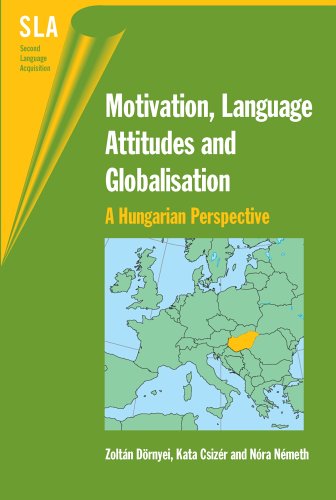

Most ebook files are in PDF format, so you can easily read them using various software such as Foxit Reader or directly on the Google Chrome browser.
Some ebook files are released by publishers in other formats such as .awz, .mobi, .epub, .fb2, etc. You may need to install specific software to read these formats on mobile/PC, such as Calibre.
Please read the tutorial at this link: https://ebookbell.com/faq
We offer FREE conversion to the popular formats you request; however, this may take some time. Therefore, right after payment, please email us, and we will try to provide the service as quickly as possible.
For some exceptional file formats or broken links (if any), please refrain from opening any disputes. Instead, email us first, and we will try to assist within a maximum of 6 hours.
EbookBell Team

4.8
24 reviews
ISBN 13: 9781853598852
Author: Zoltan Dornyei, Kata Csizer, Nora Nemeth
This volume presents the results of the largest ever language attitude/motivation survey in second language studies. The research team gathered data from over 13,000 Hungarian language learners on three successive occasions: in 1993, 1999 and 2004. The examined period covers a particularly prominent time in Hungary’s history, the transition from a closed, Communist society to a western-style democracy that became a member of the European Union in 2004. Thus, the book provides an ‘attitudinal/motivational flow-chart’ describing how significant sociopolitical changes affect the language disposition of a nation. The investigation focused on the appraisal of five target languages – English, German, French, Italian and Russian – and this multi-language design made it also possible to observe the changing status of the different languages in relation to each other over the examined 12-year period. Thus, the authors were in an ideal position to investigate the ongoing impact of language globalisation in a context where for various political/historical reasons certain transformation processes took place with unusual intensity and speed. The result is a unique blueprint of how and why language globalisation takes place in an actual language learning environment.
1 Background Information and Theory
A Thumbnail Description of Hungary
Language Globalisation
Language Attitudes and Language Learning Motivation
2 Method
Research Design and Focus Areas
Participants
Instruments
Data Collection Procedures
Data Analysis
3 Language Attitudes and Motivation in Hungary: From 1993 to 2004
Computing Attitudinal and Motivational Dimensions
Motivational Dimensions: Language Rank Order and Changes over Time
Analysis of the Two Criterion Measures: Intended Effort and Language Choice
4 Modifying Factors in Language Attitudes and Motivation: Gender, Geographical Location and School Instruction
Gender Differences
Geographical Variation in Language Attitudes and Language Preferences
Language Attitudes and Language Instruction
5 The Internal Structure of Language Learning Motivation
Structural Equation Modelling
Applying SEM in our Study
The Measurement Models
The Initially Tested Full Structural Model
The Final Full Structural Model
The Proposed Theoretical Construct
The ‘L2 Motivational Self System’
6 Language Learners’ Motivational Profiles
Cluster Analysis
The Definition of Motivational Groups/Profiles
Group Performance on the Criterion Measures
The Difference Between Groups 2 and 3
The Size and Gender Composition of the Various Motivational Groups
Third Language Interference in Language Choice and Intended Effort
Third Language Interference: Focus on English and German
7 The Effects of Intercultural Contact on Language Attitudes and Language Learning Motivation
Students’ Perception of the Number of Visitors
Factor Analysis of the Contact Variables
The Impact of Objective and Subjective Contact on the L2-Specific Variables in 1999
The Combined Effect of Objective and Subjective Contact on German in 1999
Discussion of the Contact–Attitude Relationship in the 1999 Dataset
The Contact–Attitude Relationship in the Light of the 2004 Data
motivation language attitudes and globalisation a hungarian perspective
globalization on language
the negative is the primary motivator within language
what is integrative motivation in language learning
motivation and second language acquisition
learning language motivation
Tags: Zoltan Dornyei, Kata Csizer, Nora Nemeth, Motivation, Attitudes